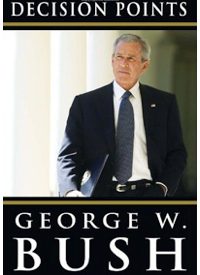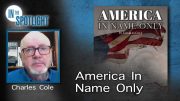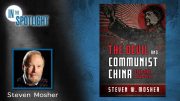
George W. Bush tells us several times in Decision Points how fond he is of humor, but obviously some of his jokes have not gone over well. There is no mention in the former President's memoir of his "search" under tables and chairs at a White House Correspondents Dinner for those weapons of mass destruction that were never found in Iraq.
Perhaps Bush decided that wasn't as amusing as his adolescent prank of pouring vodka into a fish bowl, killing his sister's pet goldfish.
In fairness, Bush does express remorse over his excessive fondness for alcohol. The first chapter, called "Quitting" is focused on his decision at age 40 to give up booze for good, a commitment he has kept ever since. He learned from his mistakes, he tells us, and moved on.
As for the assurances that Iraq had stockpiles of weapons of mass destruction, well, Bush regrets that, too. Sort of. "In retrospect, of course, we all should have pushed harder on the intelligence and revisited our assumptions," he acknowledges. "But at the time, the evidence and logic pointed in the other direction." After all, Bush recalls, there was "nearly a universal consensus" that Saddam had such weapons in abundance. "Republicans and Democrats on Capitol Hill believed it. Intelligence agencies in Germany, France, Great Britain, Russia, China and Egypt believed it." Perhaps all those agencies derived their "intelligence" on the subject by reading each other's mail and listening to each other's phone calls. Bush's logic, along with the "slam dunk" assurance of Intelligence Director George Tenet, convinced the President the intelligence was "solid."
"If Saddam didn't have WMD, why wouldn't he just prove it to the inspectors?" he asks. As he said at the time, it was not up to weapons inspectors to find the WMD, it was up to Saddam to produce and surrender them, or prove he didn't have them. Yet for all the intelligence reports and other "evidence and logic" Bush may have pondered, he gives no indication of having considered the difficulties of proving a negative to a certainty.
"If Saddam doesn't actually have WMD, I asked myself, why on earth would he subject himself to a war he will almost certainly lose?" (Emphasis in the original.) But if Saddam didn't have the WMD, he had no way to comply with the ultimatum to surrender the weapons or else. His last chance to save himself was the 48 hours Bush had given Saddam and his son Uday to leave the country before the campaign of "shock and awe" would land on Baghdad. But why would anyone expect a sovereign head of state, even a brutal thuggish totalitarian ruler, would simply leave the country when so ordered by a hostile power? Would Bush flee under similar circumstances?
Bush was convinced he could take no chances. "Saddam could have turned to Sunni terrorist groups like al Qaeda — a marriage of convenience, not ideology — as surrogates in an attempt to match Iran's use of Shia terrorist groups like Hezzbollah. The chance of biological, chemical or nuclear weapons falling into the hands of terrorists would have increased. The pressure on our friends in the region — especially Israel, Kuwait, Saudi, Arabia and United Arab Emirates — would have been intense. And the American people would be much less secure today."
As Bush's statement indicates, Saddam's secular regime and the Islamic militants of al-Qaeda were ideological foes, not allies. True, they had in common a hatred for the United States and some of their neighbors in the region, most notably Israel. But Saddam surely knew that to launch on attack, even by proxy, would be suicidal for him and his country. So what might foster that "marriage of convenience" Bush described? There is no mention of it in his memoirs, but a National Intelligence Estimate released by the CIA in October of 2002 said that Saddam, if attacked and "if sufficiently desperate," might turn to al-Qaeda to respond with a chemical or biological weapons attack on the United States.
"He might decide that the extreme step of assisting the Islamist terrorists in conducting a CBW attack against the United States would be his last chance to exact vengeance by taking a large number of victims with him," the NIE said. In other words, the invasion and "regime change" Bush was contemplating at the time would increase, not decrease the likelihood of a biological or chemical attack on the United States. Congress also had the NIE report before voting to authorize military action against Iraq, but the overwhelming majority voted to give Bush the authority he claimed he needed to protect America.
Bush also refers to the time the UN weapons inspectors were "booted out of the country," by Saddam in 1998. In fact, the inspectors were called back as President Clinton was about to launch another bombing campaign against Iraq over the firing at American pilots patrolling the "no-fly zone" created by the United States and England after the Gulf War of 1991. Clinton's need to appear powerful and in command on the eve of a scheduled vote on his impeachment may have influenced his decision somewhat. The inspectors returned to Iraq in the fall of 2002 and remained there until called back the following March, just before the United States and our coalition partners began "Operation Iraqi Freedom."
While there was no evidence connecting Iraq with the terrorist attacks of 9/11, debate over the war focused on the need to prevent future terrorist attacks on the United States and its allies. "Before 9/11, Saddam was a problem America might have been able to manage," Bush tells us. "Through the lens of the post-9/11 world, my view changed." In the chapter called "Day of Fire," Bush recollected the horrors and confusion of the September 11 attacks. He also offers an interesting comment about intelligence gathering on the al-Qaeda threat prior to that day, including the report, mentioned but not confirmed in the now famous Presidential Daily Briefing of August 6, that "bin Laden wanted to hijack a U.S. aircraft."
"On 9-11, it was obvious the intelligence community missed something big," Bush concluded. "I was alarmed by the lapse, and I expected an explanation." That was on page 135. The book ends 336 pages later without telling us if, in the remaining seven years and four months he spent in the White House, Bush ever got that explanation.
Along the way, however, he offers a revealing glimpse into the "special relationship" between the United States and Israel and how Bush perceived his role as President in advancing a worldwide "Freedom Agenda." On page 421, Bush tells of a phone call he received in the spring of 2007 from Israeli Prime Minister Ehud Olmert concerning evidence that a nuclear facility was under construction in Syria. "George, I'm asking you to bomb the compound," Olmert said. "Give me some time to look at the intelligence and Ill give you an answer," Bush replied. The intelligence was unable to confirm with "high confidence" that the nuclear reactor was part of an effort to build a nuclear bomb. "I cannot justify an attack on a sovereign nation unless my intelligence agencies stand up and say it's a weapons program," Bush told Olmert. So the Israelis acted on their own and bombed the reactor site, as they had done to a nuclear facility in Iraq in 1981.
The bombing "demonstrated Israel's willingness to act alone," Bush wrote. "Prime minister Olmert hadn't asked for a green light and I hadn't given one. He had done what he believed was necessary to protect Israel." Yet Bush was willing to do the bombing for Israel if his intelligence agencies could assure him the site was part of a weapons program. The question he neither asks nor answers in his book is, why? Since Olmert had the ability to destroy the site himself, why did he ask Bush to do it for him? And why was Bush willing to consider the request? Why should the United States play the role of surrogate army or hit man for Israel? Why should we be running a Dial-a-bomber service?
The incident provided Bush with "another reminder that intelligence is not an exact science." Neither, apparently, is reading and following the Constitution, which nowhere assigns to the President the role of policeman of the planet, even in pursuit of a worldwide "Freedom Agenda."
Decision Points by George W. Bush -Crown Publishers, New York, 2010 – $35



